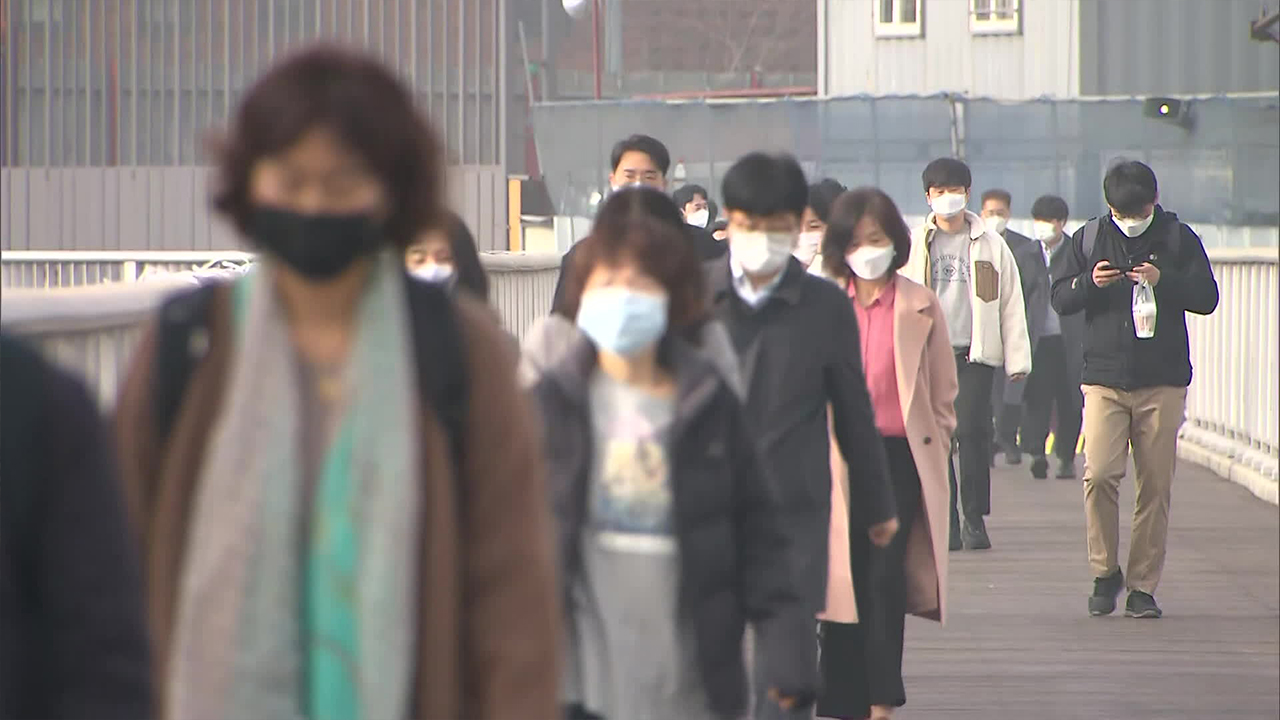[Anchor]
Ultrafine particles, which are very small, can travel through our blood vessels and cause or worsen various diseases.
It is advisable to stay indoors as much as possible and drink water frequently.
Reporter Han Seung-yeon reports.
[Report]
Fine dust is designated as a Group 1 carcinogen by the World Health Organization.
In particular, the size of ultrafine dust is less than 2.5㎛ (micrometers), which is one-thirtieth the thickness of a human hair.
Once inhaled, it enters the bloodstream beyond the lungs and causes inflammation.
Prolonged exposure can worsen respiratory diseases such as asthma and bronchitis, and it can penetrate into the alveoli, increasing the incidence of lung cancer.
Moreover, as it circulates through the bloodstream, it negatively affects various body organs, including the heart, brain, and eyes.
It can also increase the incidence of metabolic diseases such as high blood pressure and diabetes.
In particular, for the elderly with weakened immune systems, cardiovascular and respiratory diseases can worsen due to fine dust.
[Lim Young-wook/Professor at Yonsei University Environmental Pollution Research Institute: "The rapid increase in the inflammation index leads to higher blood viscosity, which acts as a major cause of the rapid deterioration of cardiovascular diseases..."]
On days with severe ultrafine dust, it is advised to refrain from outdoor exercise as well as going out as much as possible.
If you must go out, it is recommended to wear a mask that can filter fine dust, such as KF80 or higher.
Indoors, using an air purifier and cleaning with a damp cloth can help reduce fine dust concentration.
Additionally, drinking water frequently and using a humidifier to keep the respiratory mucosa moist can reduce the penetration of fine dust into the lungs.
It has not been verified that foods like pork belly are effective in reducing fine dust in the body.
This is KBS News, Han Seung-yeon.
Ultrafine particles, which are very small, can travel through our blood vessels and cause or worsen various diseases.
It is advisable to stay indoors as much as possible and drink water frequently.
Reporter Han Seung-yeon reports.
[Report]
Fine dust is designated as a Group 1 carcinogen by the World Health Organization.
In particular, the size of ultrafine dust is less than 2.5㎛ (micrometers), which is one-thirtieth the thickness of a human hair.
Once inhaled, it enters the bloodstream beyond the lungs and causes inflammation.
Prolonged exposure can worsen respiratory diseases such as asthma and bronchitis, and it can penetrate into the alveoli, increasing the incidence of lung cancer.
Moreover, as it circulates through the bloodstream, it negatively affects various body organs, including the heart, brain, and eyes.
It can also increase the incidence of metabolic diseases such as high blood pressure and diabetes.
In particular, for the elderly with weakened immune systems, cardiovascular and respiratory diseases can worsen due to fine dust.
[Lim Young-wook/Professor at Yonsei University Environmental Pollution Research Institute: "The rapid increase in the inflammation index leads to higher blood viscosity, which acts as a major cause of the rapid deterioration of cardiovascular diseases..."]
On days with severe ultrafine dust, it is advised to refrain from outdoor exercise as well as going out as much as possible.
If you must go out, it is recommended to wear a mask that can filter fine dust, such as KF80 or higher.
Indoors, using an air purifier and cleaning with a damp cloth can help reduce fine dust concentration.
Additionally, drinking water frequently and using a humidifier to keep the respiratory mucosa moist can reduce the penetration of fine dust into the lungs.
It has not been verified that foods like pork belly are effective in reducing fine dust in the body.
This is KBS News, Han Seung-yeon.
■ 제보하기
▷ 카카오톡 : 'KBS제보' 검색, 채널 추가
▷ 전화 : 02-781-1234, 4444
▷ 이메일 : kbs1234@kbs.co.kr
▷ 유튜브, 네이버, 카카오에서도 KBS뉴스를 구독해주세요!
- Risk of ultrafine dust
-
- 입력 2025-01-23 00:15:48

[Anchor]
Ultrafine particles, which are very small, can travel through our blood vessels and cause or worsen various diseases.
It is advisable to stay indoors as much as possible and drink water frequently.
Reporter Han Seung-yeon reports.
[Report]
Fine dust is designated as a Group 1 carcinogen by the World Health Organization.
In particular, the size of ultrafine dust is less than 2.5㎛ (micrometers), which is one-thirtieth the thickness of a human hair.
Once inhaled, it enters the bloodstream beyond the lungs and causes inflammation.
Prolonged exposure can worsen respiratory diseases such as asthma and bronchitis, and it can penetrate into the alveoli, increasing the incidence of lung cancer.
Moreover, as it circulates through the bloodstream, it negatively affects various body organs, including the heart, brain, and eyes.
It can also increase the incidence of metabolic diseases such as high blood pressure and diabetes.
In particular, for the elderly with weakened immune systems, cardiovascular and respiratory diseases can worsen due to fine dust.
[Lim Young-wook/Professor at Yonsei University Environmental Pollution Research Institute: "The rapid increase in the inflammation index leads to higher blood viscosity, which acts as a major cause of the rapid deterioration of cardiovascular diseases..."]
On days with severe ultrafine dust, it is advised to refrain from outdoor exercise as well as going out as much as possible.
If you must go out, it is recommended to wear a mask that can filter fine dust, such as KF80 or higher.
Indoors, using an air purifier and cleaning with a damp cloth can help reduce fine dust concentration.
Additionally, drinking water frequently and using a humidifier to keep the respiratory mucosa moist can reduce the penetration of fine dust into the lungs.
It has not been verified that foods like pork belly are effective in reducing fine dust in the body.
This is KBS News, Han Seung-yeon.
Ultrafine particles, which are very small, can travel through our blood vessels and cause or worsen various diseases.
It is advisable to stay indoors as much as possible and drink water frequently.
Reporter Han Seung-yeon reports.
[Report]
Fine dust is designated as a Group 1 carcinogen by the World Health Organization.
In particular, the size of ultrafine dust is less than 2.5㎛ (micrometers), which is one-thirtieth the thickness of a human hair.
Once inhaled, it enters the bloodstream beyond the lungs and causes inflammation.
Prolonged exposure can worsen respiratory diseases such as asthma and bronchitis, and it can penetrate into the alveoli, increasing the incidence of lung cancer.
Moreover, as it circulates through the bloodstream, it negatively affects various body organs, including the heart, brain, and eyes.
It can also increase the incidence of metabolic diseases such as high blood pressure and diabetes.
In particular, for the elderly with weakened immune systems, cardiovascular and respiratory diseases can worsen due to fine dust.
[Lim Young-wook/Professor at Yonsei University Environmental Pollution Research Institute: "The rapid increase in the inflammation index leads to higher blood viscosity, which acts as a major cause of the rapid deterioration of cardiovascular diseases..."]
On days with severe ultrafine dust, it is advised to refrain from outdoor exercise as well as going out as much as possible.
If you must go out, it is recommended to wear a mask that can filter fine dust, such as KF80 or higher.
Indoors, using an air purifier and cleaning with a damp cloth can help reduce fine dust concentration.
Additionally, drinking water frequently and using a humidifier to keep the respiratory mucosa moist can reduce the penetration of fine dust into the lungs.
It has not been verified that foods like pork belly are effective in reducing fine dust in the body.
This is KBS News, Han Seung-yeon.
-
-

한승연 기자 hanspond@kbs.co.kr
한승연 기자의 기사 모음
-
이 기사가 좋으셨다면
-
좋아요
0
-
응원해요
0
-
후속 원해요
0















이 기사에 대한 의견을 남겨주세요.